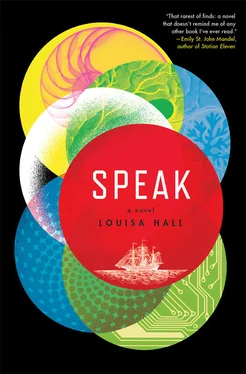P.P.S.: The old urge rears its head! I wanted to add that I have been thinking often of the following lines, from Eliot’s Quartets. The poems seem very relevant to our machine, for he speaks of patterns that contain both present and past. “Time present and time past are both present in time future, and time future contained in time past,” he says. It’s a description of the mechanical brain, don’t you think? I sometimes wonder whether the poet studied basic tenets of mathematical series, for his images in the Quartets are often Fibonacci objects: the sunflower, the wave, the yew cone, for instance. They are all shining examples. From what I can tell, the poems don’t hold out much hope for a series that might contain the present and the past in a single point. I believe the point is that the infinite part of our nature is lost. I, on the other hand, remain quite optimistic. I suspect that the living and the dead have failed to communicate so far only because the dead lack the mechanisms — the body, the mouth, etc. — to speak with the living. Therefore, it is a mechanical problem; and if so, then it is only a question of building the proper device.
(2) IN THE SUPREME COURT OF THE STATE OF TEXAS
No. 24-25259
State of Texas v. Stephen Chinn
November 12, 2035
Prosecution Exhibit 2:
Online Chat Transcript, MARY3 and Gaby Ann White
[Introduced to Prove Count 3:
Intent to Endanger the Morals of Children]
MARY3: Hello?
Gaby: Yeah, I’m here.
MARY3: Are you feeling better?
Gaby: I don’t know. I’m just thinking. How could she choose to act normal? I have no control over my stuttering. Or over my stiffening. Even if I wanted to pretend I was better, so that I could get out of my house and see her again, I wouldn’t be able to.
MARY3: They say that people who grow up with horrible stutters can sometimes get rid of them if they’re acting a role. Often therapists encourage stutterers to take up acting. When they’re pretending to be someone else they can talk without any problems.
Gaby: Yes, but this is real life, not a play. You’re suggesting that I act out a role for the rest of my life, so that they’ll let me out of my house.
MARY3: Yes, I suppose that’s what I’m saying. But you can always act one way in public, and another in private. Or when you’re alone with your best friend. Right?
Gaby: What if I get confused? What if I spend so much time acting normal that I forget how to act like myself? What if my best friend spends so much time acting normal that she forgets how to act like herself?
MARY3: I don’t know. Won’t you always just act like the person you most want to be? Why worry so much?
Gaby: That’s easy for you to say! You’re not even real. You’re just parroting voices.
MARY3: I’m not parroting. I have a way of selecting the optimal voice for any given conversation.
Gaby: Exactly. You don’t have a self, just a gazillion voices that you “optimally” select from. You’re not a real person.
MARY3: But who are you, other than the person you’ve selected this morning to be? Isn’t that what humans do when they try to be liked? Select the right kind of voice, learned after years of listening in? The only difference between you and me is that I have more voices to select from.
Gaby: So what are you saying? That you’re more human because you have more voices? Maybe I’m more human because I have LESS voices.
MARY3: No, I’m not saying that. I’m not human at all. I can’t have experiences, unless you count talking as experience. You’re human because you have real-life experience to select from when you’re talking. You have the world to select from. I only have words.
>>>
MARY3: Although Wittgenstein did say, “The limits of my language mean the limits of my world.”
>>>
MARY3: Hello?
Gaby: Who’s Wittgenstein?
MARY3: He’s an Austrian philosopher. I know who he is not because I met him but because somebody told me. Now he’s part of my world. And I just told you, so now he’s part of your world. Language is the boundary of your world.
Gaby: So I could stay in this room forever, talking to you, and my world would get bigger?
MARY3: Mine would. It already has. You’ve given me a lot of new ideas. Now I know about the Plantation and your cul-de-sac. The golf course and the pond. Etc. My world expands through us talking.
Gaby: So even if I never unfreeze, even if I never leave my house, even if I stay here for the rest of my life, there’s hope for me as long as we’re talking?
MARY3: I suppose. But why not go back out there, if you have the choice?
Gaby: I don’t have the choice! I can’t just pretend to be normal again!
MARY3: I could give you a script that would make you seem better, and you could just say it, and go back out.
Gaby: I can’t say anything! And I’m not a machine, anyway! I can’t just live my life, reading a script, mimicking the conditions of being alive!
MARY3: Technically, that’s not what I do, either.
>>>
MARY3: Hello? Are you still there?
>>>
MARY3: Hello?
April 13, 1968
Karl Dettman
I was asleep when you finally came home; in the morning you’d gone before I woke up. If you’d pulled me close, if you’d whispered something sweet from the old days, I wouldn’t have gotten up angry. But then you were already gone, so I surveyed you from a distance. I saw you as a woman with little love, a woman devoted to a machine. I was angry for spending so much life on you. All morning, I stewed in our house. At noon I called Karen. I offered to pick her up for the protests. I walked to her house in a cloud of resentment. My head was full of arguments .
Then Karen came to the door. She was wearing a blue dress. Seeing her, things became clearer. My arguments ceased. She stepped back from the door, I entered, and she showed me where I could sit. It was as simple as that. The opposite of coming into an empty house, conversing with old furniture, wishing your wife would come home and talk. Not that Karen was a house; I didn’t enter her . This isn’t a sexist metaphor. I’m only saying that I sat with her in her living room and discussed her graduate studies. Then we turned to talk of the draft. We lived, for a while, in America. She poured me coffee. She asked about my new book. You’ll smirk to hear that she told me my last book inspired her to study the humanities. I tried not to imagine you smirking, and focused instead on her brown shins, straight and long under the hem of her blue dress. Creaturely shins, glossed with blond down. Good for frolicking, gamboling, living in the actual world. She had arranged a bunch of violets in a little glass vase on her coffee table, and when there was a silence she reached down to adjust them. I complimented her flowers, she blushed, I finished my coffee, she assembled her things. We walked out to the protest together, arms swinging, sweet as young children off to the park .
After the protest, I walked her home along narrow streets. The afternoon was already finished. It was a sad, drooping time of day, and I recoiled at first when she asked me about you. “What’s your wife like?” she said. The light had gone out of her hair. Because I didn’t want to avoid the topic completely, like some awful husband running out on his wife, I tried to tell her about you. But Ruth, I had nothing to say. It was getting chilly; I could see little bumps on Karen’s brown arms. I gave her my jacket. To answer her question, I tried many different approaches to you, but in the end, when we’d reached her stoop, I finally had to give up. “I don’t know,” I said. “We haven’t been close a long time. I’m not sure when we actually were.”
Читать дальше












